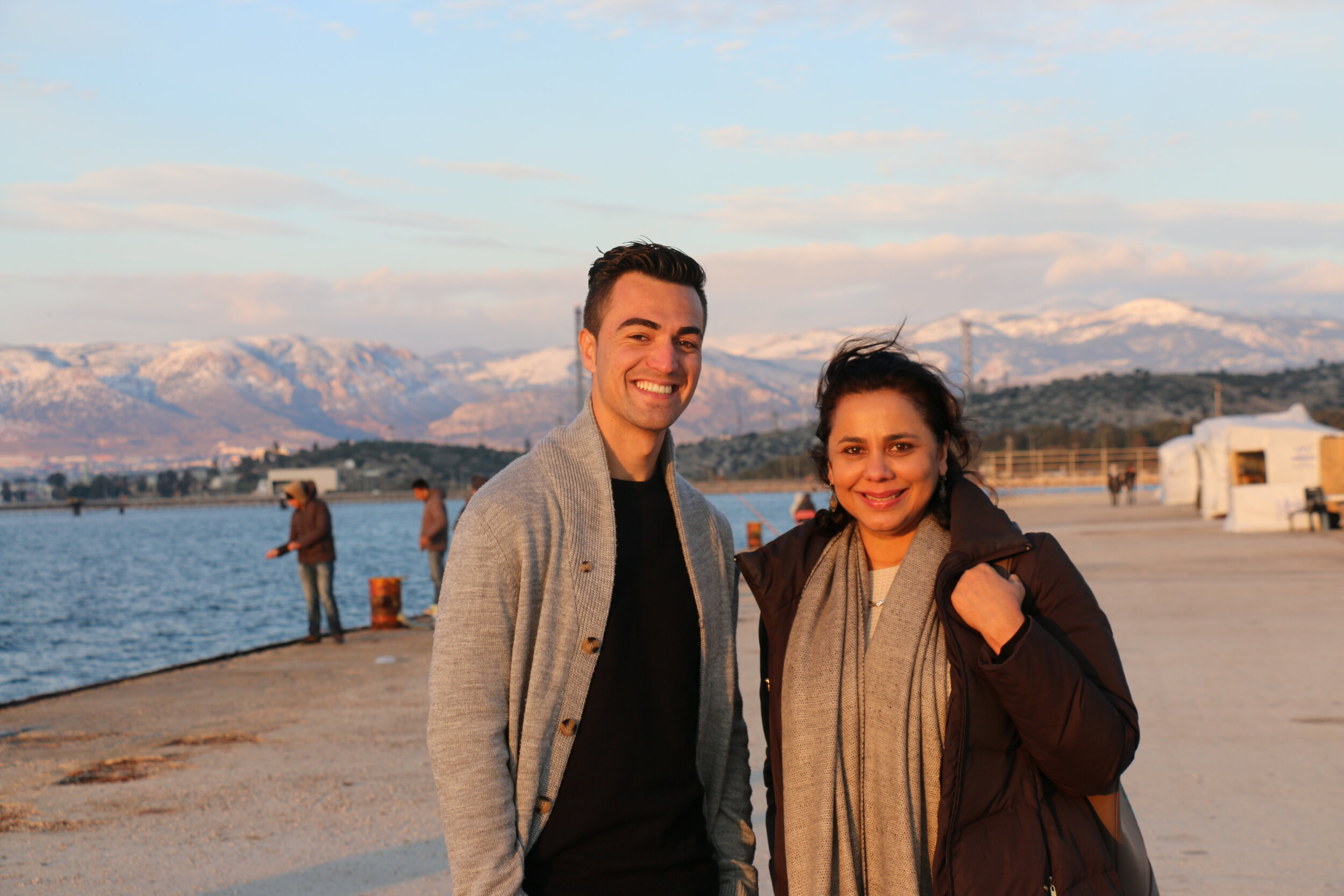My goal is my mother
Athens, Greece
We met Fahim the first evening we arrived in Athens. He is a professional soccer player, and used to play for the national team in Afghanistan. That was before he started getting death threats from the Taliban. He escaped Kabul with the help of smugglers over two years ago. Now he lives at Skaramangas refugee camp outside Athens and plays on a Greek refugee soccer team; he also coaches young boys at the camp.
We wanted to surprise the boys at the camp with good quality soccer balls and warm outerwear, so we headed to InterSport. Fahim tossed several Adidas soccer balls -and a Barça ball, his favorite team - into a large net bag; and we chose navy and red sweatshirts and pants in a variety of sizes.When the person at the register found out that we were buying these for children at a refugee camp, he walked us to the bakery next door and bought a big box of cookies for the kids; when the bakery owner learned of the project, he packed a box of savories as a gift. It was the week of Christmas and we felt like Santa, laden with bags full of soccer balls, track suits and treats. The kids at the Skaramangas refugee camp flock to Fahim as soon as they see him; first a couple, then more; by the time we reach his ‘caravan’ - a 10x20 container that he shares with several others and calls home - there is an entire posse of boys vying for his attention. Fahim has a wonderful rapport with children; of course the fact that he is a professional soccer player, wears a cool FIFA sweatshirt (that they all want), and has the gelled hair and cool swag of a sports star, also helps.The boys changed into their new ‘uniforms’ that we had bought for them and ran excitedly to the field – an incongruous patch of bright green turf donated by the British Council, in the middle of a wide expanse of asphalt and rows and rows of white containers; two dumpsters serve as goal posts. It was 2 degrees Celsius and the winds from the bay were bitter hardly mattered. Fahim got the boys warmed up, split them into teams and let them revel in an hour of pure joy, where they could forget the perilous journeys that brought them to this unusual circumstance, and simply be kids.[video poster="http://www.salmahasanali.com/wp-content/uploads/2017/05/IMG_8263.jpg" width="1920" height="1080" mp4="http://www.salmahasanali.com/wp-content/uploads/2017/06/MVI_8215.mp4"][/video] After practice, Saanya and I warm up in Fahim's caravan, and listen to his story. “I lived in Kabul. I have a big family - mother, father, four brothers and two sisters; one sister is in Norway," Fahim starts. "I left Afghanistan because I was a famous player and also a FIFA instructor. I got a lot of messages from Taliban and from ISIS that leave this job because it is supported by American people. But I would never do that, I loved my job. After a few months, I got four or five papers warning from the ISIS. They attacked me two times; they injured my eyes. It’s really, really bad situation. When I went for my job, they catch me and they attack me with a knife. After that, my family decided I have to leave Afghanistan; it is too dangerous for me. Also my mother was living in Germany, she left in 2012. I have to go there; four years it’s a long time she didn’t see her kids."
The kids at the Skaramangas refugee camp flock to Fahim as soon as they see him; first a couple, then more; by the time we reach his ‘caravan’ - a 10x20 container that he shares with several others and calls home - there is an entire posse of boys vying for his attention. Fahim has a wonderful rapport with children; of course the fact that he is a professional soccer player, wears a cool FIFA sweatshirt (that they all want), and has the gelled hair and cool swag of a sports star, also helps.The boys changed into their new ‘uniforms’ that we had bought for them and ran excitedly to the field – an incongruous patch of bright green turf donated by the British Council, in the middle of a wide expanse of asphalt and rows and rows of white containers; two dumpsters serve as goal posts. It was 2 degrees Celsius and the winds from the bay were bitter hardly mattered. Fahim got the boys warmed up, split them into teams and let them revel in an hour of pure joy, where they could forget the perilous journeys that brought them to this unusual circumstance, and simply be kids.[video poster="http://www.salmahasanali.com/wp-content/uploads/2017/05/IMG_8263.jpg" width="1920" height="1080" mp4="http://www.salmahasanali.com/wp-content/uploads/2017/06/MVI_8215.mp4"][/video] After practice, Saanya and I warm up in Fahim's caravan, and listen to his story. “I lived in Kabul. I have a big family - mother, father, four brothers and two sisters; one sister is in Norway," Fahim starts. "I left Afghanistan because I was a famous player and also a FIFA instructor. I got a lot of messages from Taliban and from ISIS that leave this job because it is supported by American people. But I would never do that, I loved my job. After a few months, I got four or five papers warning from the ISIS. They attacked me two times; they injured my eyes. It’s really, really bad situation. When I went for my job, they catch me and they attack me with a knife. After that, my family decided I have to leave Afghanistan; it is too dangerous for me. Also my mother was living in Germany, she left in 2012. I have to go there; four years it’s a long time she didn’t see her kids."
“My goal is my mother. First my mother. Then my football and my futures.”
 Fahim left Afghanistan on January 1, 2015, and traveled with a smuggler through Pakistan, Iran, Turkey, then Greece. When I asked about the trip, he just kept repeating, “it’s really really bad situation.” The first time he tried to cross from Turkey to Greece, he was on the sea for five hours, his boat broke and everyone had to throw their belongings overboard. “It’s 99% chance we’re going to die,” he says. "But because of God, we survive; the police came to survive us and we go back to Turkey.” He tried again, and again, and again; each time the police would catch them or the conditions were so treacherous they had to turn around. The fifth time, they made it.After a week on the Greek island of Samos, Fahim arrived at Piraeus Port in Athens; things got even worse. He lived in squalid conditions in flimsy, porous tents, standing hours in line to use one bathroom, with no hot water, deplorable food, and little hope. “I never live in such bad situation; I never believe how people can live like this.” But he thought to himself that he’s come this far to build his future, he’s not going to give up now. So he formed a soccer team with others at the camp. “Every night we were playing, and I just forget it, where I live."
Fahim left Afghanistan on January 1, 2015, and traveled with a smuggler through Pakistan, Iran, Turkey, then Greece. When I asked about the trip, he just kept repeating, “it’s really really bad situation.” The first time he tried to cross from Turkey to Greece, he was on the sea for five hours, his boat broke and everyone had to throw their belongings overboard. “It’s 99% chance we’re going to die,” he says. "But because of God, we survive; the police came to survive us and we go back to Turkey.” He tried again, and again, and again; each time the police would catch them or the conditions were so treacherous they had to turn around. The fifth time, they made it.After a week on the Greek island of Samos, Fahim arrived at Piraeus Port in Athens; things got even worse. He lived in squalid conditions in flimsy, porous tents, standing hours in line to use one bathroom, with no hot water, deplorable food, and little hope. “I never live in such bad situation; I never believe how people can live like this.” But he thought to himself that he’s come this far to build his future, he’s not going to give up now. So he formed a soccer team with others at the camp. “Every night we were playing, and I just forget it, where I live." After spending a few days with Fahim, seeing his caring ways towards the kids and his charming disposition, I wanted to ask him what was really on my mind: doesn’t he ever think that this is utterly unfair; that one day he’s living at home with his family, doing what he loves, getting attention as a soccer personality - and now he’s alone, living in a box, trying to figure out how, when, or if he is ever going to get out. His response: “This is life."
After spending a few days with Fahim, seeing his caring ways towards the kids and his charming disposition, I wanted to ask him what was really on my mind: doesn’t he ever think that this is utterly unfair; that one day he’s living at home with his family, doing what he loves, getting attention as a soccer personality - and now he’s alone, living in a box, trying to figure out how, when, or if he is ever going to get out. His response: “This is life." It’s the thought of reuniting with his mother that gives him hope, or in his words, power. “When I hear my mother saying my name, it gives me power. When I talk to her on the phone, she give me power; she tells me, ‘ok, my son, don’t worry about nothing, you will be here InshAllah. Don’t feel alone, I’m always with you’.”A few days later, when Saanya and I were in Lesbos, we got a Facebook message from Fahim with the ultimate news: he got a call that day that his papers had been approved and that he will soon be reunited with his mother in Germany. Saanya and I both screamed with excitement. Of course, Fahim was overjoyed, but also feeling cautious until he could confirm the news several times with the authorities.We wanted to celebrate with Fahim and decided to come back early from Lesbos so we could spend a day at Skaramangas camp before returning to the U.S. I contacted our friend Kim in California who had connected us to Fahim and friends, and asked about Fahim’s favorite foods – spinach and cheese pies, olives, fruits, and lots of black pepper, she said.We went to the market and bakery and picked up a variety of foods, and a plastic bag of freshly ground black pepper. Fahim made his famous eggs with onions and tomatoes, in his caravan on a small burner, with four friends, chopping, dicing and frying. Friends in the caravan across made an Afghani rice and chicken dish; others brought drinks and shwarma sandwiches. Before we knew it, we had a feast. There must have been a least 15 of us, adults and kids sitting on the floor, laughing, talking, eating, sharing, drawing, holding on tight to a bit of good news that spelled hope.And Fahim was smiling, dousing his eggs with heaps and heaps of black pepper.
It’s the thought of reuniting with his mother that gives him hope, or in his words, power. “When I hear my mother saying my name, it gives me power. When I talk to her on the phone, she give me power; she tells me, ‘ok, my son, don’t worry about nothing, you will be here InshAllah. Don’t feel alone, I’m always with you’.”A few days later, when Saanya and I were in Lesbos, we got a Facebook message from Fahim with the ultimate news: he got a call that day that his papers had been approved and that he will soon be reunited with his mother in Germany. Saanya and I both screamed with excitement. Of course, Fahim was overjoyed, but also feeling cautious until he could confirm the news several times with the authorities.We wanted to celebrate with Fahim and decided to come back early from Lesbos so we could spend a day at Skaramangas camp before returning to the U.S. I contacted our friend Kim in California who had connected us to Fahim and friends, and asked about Fahim’s favorite foods – spinach and cheese pies, olives, fruits, and lots of black pepper, she said.We went to the market and bakery and picked up a variety of foods, and a plastic bag of freshly ground black pepper. Fahim made his famous eggs with onions and tomatoes, in his caravan on a small burner, with four friends, chopping, dicing and frying. Friends in the caravan across made an Afghani rice and chicken dish; others brought drinks and shwarma sandwiches. Before we knew it, we had a feast. There must have been a least 15 of us, adults and kids sitting on the floor, laughing, talking, eating, sharing, drawing, holding on tight to a bit of good news that spelled hope.And Fahim was smiling, dousing his eggs with heaps and heaps of black pepper. Epilogue: I was in touch with Fahim today (June 2017) to find out how he's doing; he's so thankful for everyone's good wishes and prayers from this story. After getting the news in January that his reunification application had been approved, he found out that he'd been accepted by Germany in late April. He's now waiting for the actual travel date and documents. Things move slowly. He's not sure when he might know but he's hoping it will be in July.He says the hardest part will be once he gets to Germany. He still needs to pass interviews in Germany before the authorities make the final approvals. He then needs to find a new apartment where he can live with his mom, and a job to pay for it. "It will be hard but I'm ready to build a future there," he said by Facebook messenger."My mother is fine, she is waiting to see me so much, she always cries when I call her," he said. "Now we are both worried about my family in Afghanistan, because of the explosions in Kabul."Here's his Ramadan message to the world: "I wish we could spend this Ramadan peacefully, no matter where we are. We should celebrate this month with good feelings and without fighting and killing."Ameen.
Epilogue: I was in touch with Fahim today (June 2017) to find out how he's doing; he's so thankful for everyone's good wishes and prayers from this story. After getting the news in January that his reunification application had been approved, he found out that he'd been accepted by Germany in late April. He's now waiting for the actual travel date and documents. Things move slowly. He's not sure when he might know but he's hoping it will be in July.He says the hardest part will be once he gets to Germany. He still needs to pass interviews in Germany before the authorities make the final approvals. He then needs to find a new apartment where he can live with his mom, and a job to pay for it. "It will be hard but I'm ready to build a future there," he said by Facebook messenger."My mother is fine, she is waiting to see me so much, she always cries when I call her," he said. "Now we are both worried about my family in Afghanistan, because of the explosions in Kabul."Here's his Ramadan message to the world: "I wish we could spend this Ramadan peacefully, no matter where we are. We should celebrate this month with good feelings and without fighting and killing."Ameen.  Photos: Saanya AliSaanya and I planned this trip to Greece in January at the very last minute; it would not have been possible to meet any of the people I'll be writing about without the help of Kim Malcolm, someone we didn’t even know. Kim lives in California and about two years ago traveled to Greece to volunteer. She formed strong relationships, has been back several times to volunteer, and is doing amazing work to support refugees on the ground, including many of the people whose stories I’ll be sharing. Right now, her focus is on getting emergency dental treatment for people with infections, as well as emergency food supplies to the homeless and those living in squats. She also wants to start a girl’s empowerment and leadership program. Please support her efforts by donating through this link, and indicate “Greece/refugees” in the designation section. http://mionline.org/donate/
Photos: Saanya AliSaanya and I planned this trip to Greece in January at the very last minute; it would not have been possible to meet any of the people I'll be writing about without the help of Kim Malcolm, someone we didn’t even know. Kim lives in California and about two years ago traveled to Greece to volunteer. She formed strong relationships, has been back several times to volunteer, and is doing amazing work to support refugees on the ground, including many of the people whose stories I’ll be sharing. Right now, her focus is on getting emergency dental treatment for people with infections, as well as emergency food supplies to the homeless and those living in squats. She also wants to start a girl’s empowerment and leadership program. Please support her efforts by donating through this link, and indicate “Greece/refugees” in the designation section. http://mionline.org/donate/

